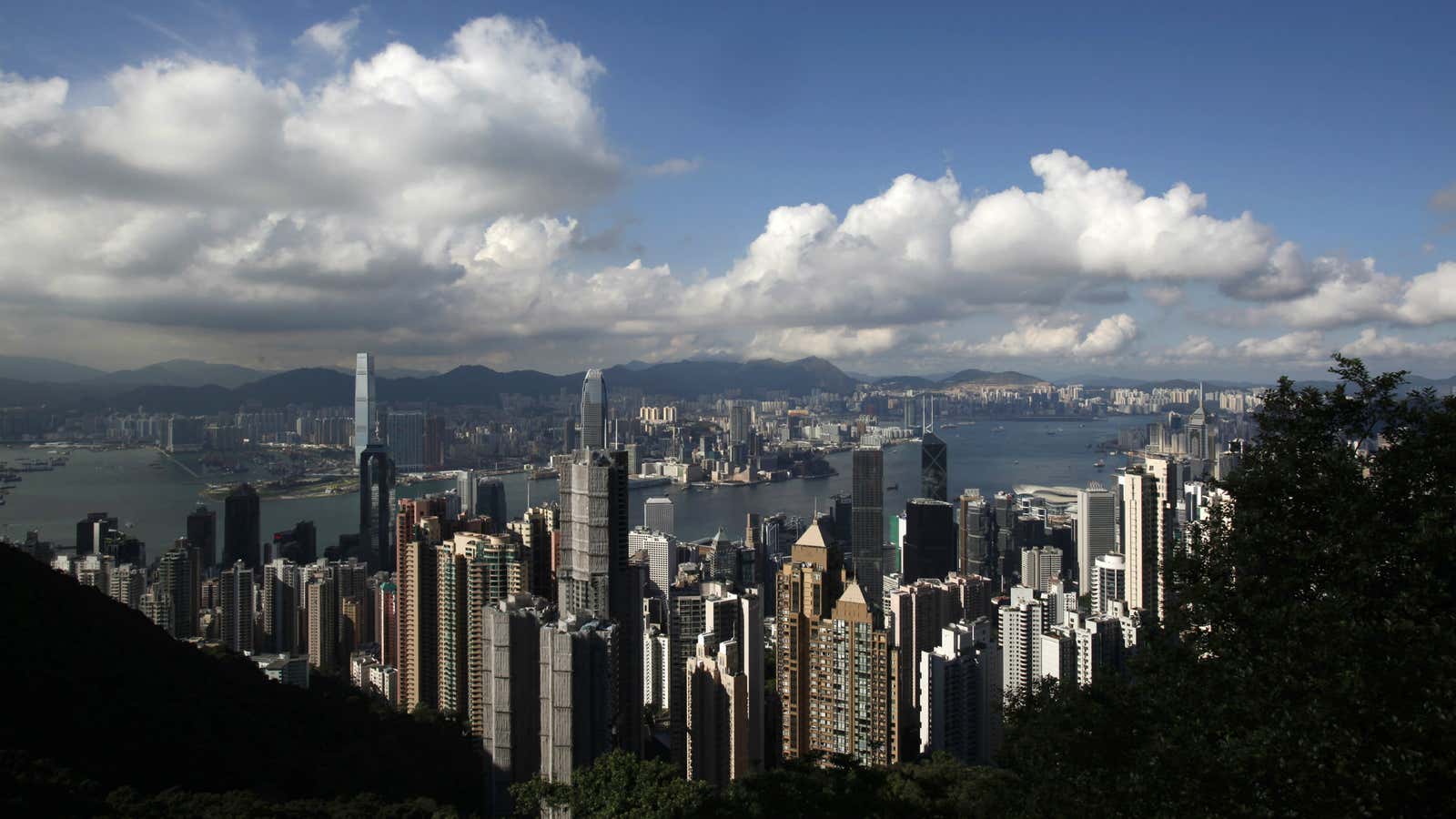Recently, HSBC and other banks pulled advertising from a Hong Kong newspaper critical of the mainland Chinese government, citing “commercial considerations.” Now the massive British bank is advising investors to sell stock in Hong Kong companies, in part because of a planned (but as-of-yet unscheduled) demonstration called “Occupy Central With Love and Peace.”
Protest organizers, led by a university professor, have pledged to “shut down” central Hong Kong with a sit-in unless Beijing responds to demands for universal suffrage, which the Chinese government promised to allow by 2017. “Shut down” is probably overstating the potential impact of Occupy Central’s demonstrations, which are supposed to occur sometime in the next few months. The group’s organizers expect a maximum of 10,000 people to participate, about one-third the size of Hong Kong’s police force. Police have already been training in methods of arresting and removing protestors, meaning any “Occupy” movement would be unlikely to last more than a few hours, or a day at most.
The Occupy Central group has already organized an online poll and a led a march on the 17th anniversary of Hong Kong’s handover without incident.
Still, HSBC analysts said that’s reason enough to sell Hong Kong company stocks in their “Global Equity Insights Quarterly” report issued today. In a copy of the report that was distributed to reporters today at 10:53 am in Hong Kong, HSBC analysts wrote:
We reduce Hong Kong to underweight on concerns about negative news flow. “Occupy Central,” a campaign for greater democracy, could sour relations with China and may hurt the economy.
That was all analysts said about Hong Kong in the report, which covers markets around the world. HSBC’s overall recommendation on Hong Kong was previously “neutral.” The recommendation presumably covers all stocks that trade in Hong Kong, which averaged sales of HK$63 billion ($8 billion) a day for the first six months of 2014 and have an overall market cap in the trillions of dollars.
Social media users immediately ridiculed the report and, later in the day, HSBC issued an updated version, which was sent to Quartz after 5:00 pm Hong Kong time—this time with some beefed up reasons for its downgrade of Hong Kong stocks:
We reduce Hong Kong to underweight on the risk of weak residential real estate prices, the slowdown in mainland tourist arrivals, the market’s link to US interest rates (the Fed could raise rates next year) and weak earnings momentum. We also note recent concerns about negative news flow regarding the “Occupy Central” campaign.
An HSBC spokesman confirmed the change to Quartz: “We did update the report, and that happens from time to time to reflect updates and clarifications on views.”
HSBC’s concerns that a one-day protest could disrupt Hong Kong’s stock market come across as a bit alarmist considering some of the bank’s recent calls in other parts of the world. For example, an HSBC investors note on the military coup in Thailand—a movement that completely ousted the existing government—explained that “market impact [is] limited so far.”
And then there’s the fact that advising clients to sell stocks because of an impending pro-democracy event might not actually be the best advice HSBC can give. After Hong Kong’s July 1 march to mark the anniversary of the handover to Beijing, which attracted over 100,000 marchers, the Hang Seng index popped 1.6% and a sub-index that includes Hong Kong companies that don’t do business in mainland China, jumped 2.2%.
HSBC is not the the only company that has criticized Hong Kong’s Occupy Central movement and a rising tide of anger against the Chinese government, which has launched what many see as a gloves-off attack attack on free speech and demands for democracy in Hong Kong.
Standard Chartered also pulled advertising from the same pro-democracy newspaper that HSBC did, business groups from India and Canada have decried the one-day Occupy Central protest and Ernst & Young, Pricewaterhouse, KPMG and Deloitte took out an ad warning it could force “multinational companies and investors” to move their regional center from Hong Kong.
